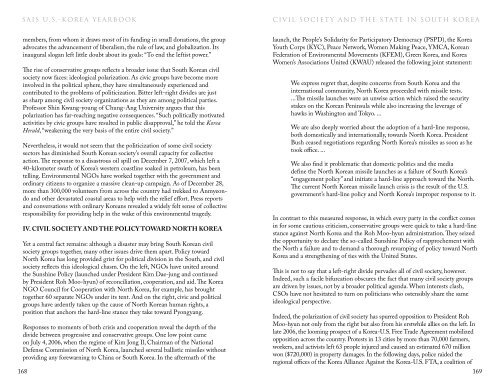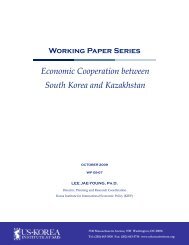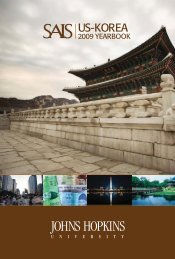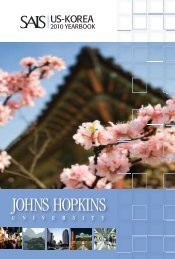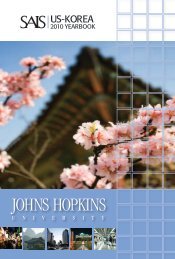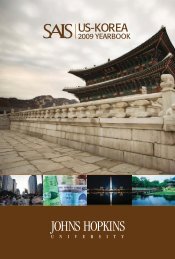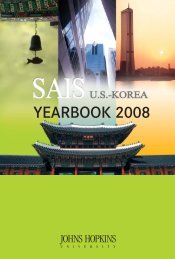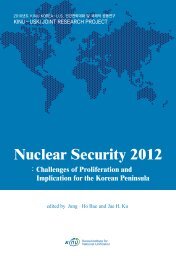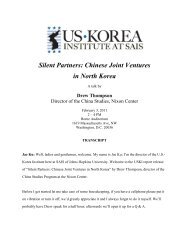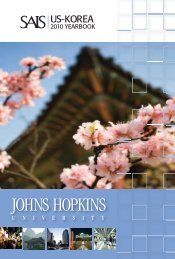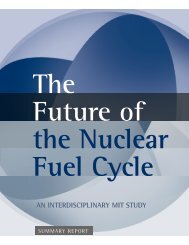Civil Society and the State in South Korea, by Michael Richardson
Civil Society and the State in South Korea, by Michael Richardson
Civil Society and the State in South Korea, by Michael Richardson
You also want an ePaper? Increase the reach of your titles
YUMPU automatically turns print PDFs into web optimized ePapers that Google loves.
SAIS U.S.-KOREA YEARBOOK<br />
CIVIL SOCIETY AND THE STATE IN SOUTH KOREA<br />
members, from whom it draws most of its fund<strong>in</strong>g <strong>in</strong> small donations, <strong>the</strong> group<br />
advocates <strong>the</strong> advancement of liberalism, <strong>the</strong> rule of law, <strong>and</strong> globalization. Its<br />
<strong>in</strong>augural slogan left little doubt about its goals: “To end <strong>the</strong> leftist power.”<br />
The rise of conservative groups reflects a broader issue that <strong>South</strong> <strong>Korea</strong>n civil<br />
society now faces: ideological polarization. As civic groups have become more<br />
<strong>in</strong>volved <strong>in</strong> <strong>the</strong> political sphere, <strong>the</strong>y have simultaneously experienced <strong>and</strong><br />
contributed to <strong>the</strong> problems of politicization. Bitter left-right divides are just<br />
as sharp among civil society organizations as <strong>the</strong>y are among political parties.<br />
Professor Sh<strong>in</strong> Kwang-young of Chung-Ang University argues that this<br />
polarization has far-reach<strong>in</strong>g negative consequences. “Such politically motivated<br />
activities <strong>by</strong> civic groups have resulted <strong>in</strong> public disapproval,” he told <strong>the</strong> <strong>Korea</strong><br />
Herald, “weaken<strong>in</strong>g <strong>the</strong> very basis of <strong>the</strong> entire civil society.”<br />
Never<strong>the</strong>less, it would not seem that <strong>the</strong> politicization of some civil society<br />
sectors has dim<strong>in</strong>ished <strong>South</strong> <strong>Korea</strong>n society’s overall capacity for collective<br />
action. The response to a disastrous oil spill on December 7, 2007, which left a<br />
40-kilometer swath of <strong>Korea</strong>’s western coastl<strong>in</strong>e soaked <strong>in</strong> petroleum, has been<br />
tell<strong>in</strong>g. Environmental NGOs have worked toge<strong>the</strong>r with <strong>the</strong> government <strong>and</strong><br />
ord<strong>in</strong>ary citizens to organize a massive clean-up campaign. As of December 28,<br />
more than 300,000 volunteers from across <strong>the</strong> country had trekked to Anmyeondo<br />
<strong>and</strong> o<strong>the</strong>r devastated coastal areas to help with <strong>the</strong> relief effort. Press reports<br />
<strong>and</strong> conversations with ord<strong>in</strong>ary <strong>Korea</strong>ns revealed a widely felt sense of collective<br />
responsibility for provid<strong>in</strong>g help <strong>in</strong> <strong>the</strong> wake of this environmental tragedy.<br />
IV. CIVIL SOCIETY AND THE POLICY TOWARD NORTH KOREA<br />
Yet a central fact rema<strong>in</strong>s: although a disaster may br<strong>in</strong>g <strong>South</strong> <strong>Korea</strong>n civil<br />
society groups toge<strong>the</strong>r, many o<strong>the</strong>r issues drive <strong>the</strong>m apart. Policy toward<br />
North <strong>Korea</strong> has long provided grist for political division <strong>in</strong> <strong>the</strong> <strong>South</strong>, <strong>and</strong> civil<br />
society reflects this ideological chasm. On <strong>the</strong> left, NGOs have united around<br />
<strong>the</strong> Sunsh<strong>in</strong>e Policy (launched under President Kim Dae-jung <strong>and</strong> cont<strong>in</strong>ued<br />
<strong>by</strong> President Roh Moo-hyun) of reconciliation, cooperation, <strong>and</strong> aid. The <strong>Korea</strong><br />
NGO Council for Cooperation with North <strong>Korea</strong>, for example, has brought<br />
toge<strong>the</strong>r 60 separate NGOs under its tent. And on <strong>the</strong> right, civic <strong>and</strong> political<br />
groups have ardently taken up <strong>the</strong> cause of North <strong>Korea</strong>n human rights, a<br />
position that anchors <strong>the</strong> hard-l<strong>in</strong>e stance <strong>the</strong>y take toward Pyongyang.<br />
Responses to moments of both crisis <strong>and</strong> cooperation reveal <strong>the</strong> depth of <strong>the</strong><br />
divide between progressive <strong>and</strong> conservative groups. One low po<strong>in</strong>t came<br />
on July 4, 2006, when <strong>the</strong> regime of Kim Jong Il, Chairman of <strong>the</strong> National<br />
Defense Commission of North <strong>Korea</strong>, launched several ballistic missiles without<br />
provid<strong>in</strong>g any forewarn<strong>in</strong>g to Ch<strong>in</strong>a or <strong>South</strong> <strong>Korea</strong>. In <strong>the</strong> aftermath of <strong>the</strong><br />
launch, <strong>the</strong> People’s Solidarity for Participatory Democracy (PSPD), <strong>the</strong> <strong>Korea</strong><br />
Youth Corps (KYC), Peace Network, Women Mak<strong>in</strong>g Peace, YMCA, <strong>Korea</strong>n<br />
Federation of Environmental Movements (KFEM), Green <strong>Korea</strong>, <strong>and</strong> <strong>Korea</strong><br />
Women’s Associations United (KWAU) released <strong>the</strong> follow<strong>in</strong>g jo<strong>in</strong>t statement:<br />
We express regret that, despite concerns from <strong>South</strong> <strong>Korea</strong> <strong>and</strong> <strong>the</strong><br />
<strong>in</strong>ternational community, North <strong>Korea</strong> proceeded with missile tests.<br />
...The missile launches were an unwise action which raised <strong>the</strong> security<br />
stakes on <strong>the</strong> <strong>Korea</strong>n Pen<strong>in</strong>sula while also <strong>in</strong>creas<strong>in</strong>g <strong>the</strong> leverage of<br />
hawks <strong>in</strong> Wash<strong>in</strong>gton <strong>and</strong> Tokyo. ...<br />
We are also deeply worried about <strong>the</strong> adoption of a hard-l<strong>in</strong>e response,<br />
both domestically <strong>and</strong> <strong>in</strong>ternationally, towards North <strong>Korea</strong>. President<br />
Bush ceased negotiations regard<strong>in</strong>g North <strong>Korea</strong>’s missiles as soon as he<br />
took office. ...<br />
We also f<strong>in</strong>d it problematic that domestic politics <strong>and</strong> <strong>the</strong> media<br />
def<strong>in</strong>e <strong>the</strong> North <strong>Korea</strong>n missile launches as a failure of <strong>South</strong> <strong>Korea</strong>’s<br />
“engagement policy” <strong>and</strong> <strong>in</strong>itiate a hard-l<strong>in</strong>e approach toward <strong>the</strong> North.<br />
The current North <strong>Korea</strong>n missile launch crisis is <strong>the</strong> result of <strong>the</strong> U.S.<br />
government’s hard-l<strong>in</strong>e policy <strong>and</strong> North <strong>Korea</strong>’s improper response to it.<br />
In contrast to this measured response, <strong>in</strong> which every party <strong>in</strong> <strong>the</strong> conflict comes<br />
<strong>in</strong> for some cautious criticism, conservative groups were quick to take a hard-l<strong>in</strong>e<br />
stance aga<strong>in</strong>st North <strong>Korea</strong> <strong>and</strong> <strong>the</strong> Roh Moo-hyun adm<strong>in</strong>istration. They seized<br />
<strong>the</strong> opportunity to declare <strong>the</strong> so-called Sunsh<strong>in</strong>e Policy of rapprochement with<br />
<strong>the</strong> North a failure <strong>and</strong> to dem<strong>and</strong> a thorough revamp<strong>in</strong>g of policy toward North<br />
<strong>Korea</strong> <strong>and</strong> a streng<strong>the</strong>n<strong>in</strong>g of ties with <strong>the</strong> United <strong>State</strong>s.<br />
This is not to say that a left-right divide pervades all of civil society, however.<br />
Indeed, such a facile bifurcation obscures <strong>the</strong> fact that many civil society groups<br />
are driven <strong>by</strong> issues, not <strong>by</strong> a broader political agenda. When <strong>in</strong>terests clash,<br />
CSOs have not hesitated to turn on politicians who ostensibly share <strong>the</strong> same<br />
ideological perspective.<br />
Indeed, <strong>the</strong> polarization of civil society has spurred opposition to President Roh<br />
Moo-hyun not only from <strong>the</strong> right but also from his erstwhile allies on <strong>the</strong> left. In<br />
late 2006, <strong>the</strong> loom<strong>in</strong>g prospect of a <strong>Korea</strong>-U.S. Free Trade Agreement mobilized<br />
opposition across <strong>the</strong> country. Protests <strong>in</strong> 13 cities <strong>by</strong> more than 70,000 farmers,<br />
workers, <strong>and</strong> activists left 63 people <strong>in</strong>jured <strong>and</strong> caused an estimated 670 million<br />
won ($720,000) <strong>in</strong> property damages. In <strong>the</strong> follow<strong>in</strong>g days, police raided <strong>the</strong><br />
regional offices of <strong>the</strong> <strong>Korea</strong> Alliance Aga<strong>in</strong>st <strong>the</strong> <strong>Korea</strong>-U.S. FTA, a coalition of<br />
168 169


